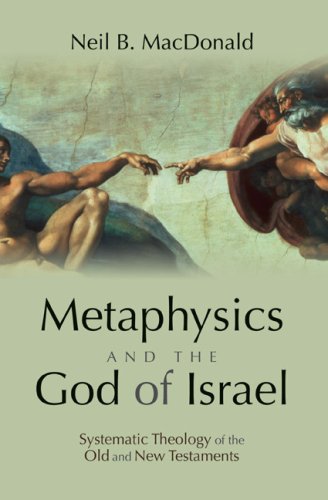Neil MacDonald: Metaphysics and the God of Israel
 Neil B. MacDonald, Metaphysics and the God of Israel: Systematic Theology of the Old and New Testaments (Grand Rapids: Baker Academic, 2006).
Neil B. MacDonald, Metaphysics and the God of Israel: Systematic Theology of the Old and New Testaments (Grand Rapids: Baker Academic, 2006).
Neil B. MacDonald (PhD, University of Edinburgh) is currently a lecturer in theology at the University of Surrey Roehampton in London. Academic specialization can lead to a lack of communication among closely related disciplines, with theology and biblical studies being a case in point. MacDonald attempts to bridge these two disciplines with help from analytic philosophy. So then, this volume is an attempt by a non-evangelical to overcome the barriers between biblical studies, philosophy and systematic theology.
Within this volume, MacDonald covers a broad range of theologians and philosophers, including Aristotle, Anselm, Augustine, and N. T. Wright, though he approaches theology from a broadly Barthian perspective. MacDonald seeks to bridge systematic theology of the Old Testament with systematic theology of the New Testament, and he does so by illustrating the God of Israel as essentially a judging, yet desisting, and forbearing entity. This judging, yet desisting, and forbearing God reveals himself in creation, in the Exodus, in primeval history, in Deuteronomistic history, and ultimately within the Gospel narrative.
MacDonald insists that thinking about God in terms of divine identity is more profitable for a comprehensive systematic theology than is thinking about God in terms of the patristic concept of ousia (i.e., substance). MacDonald believes that it is only by understanding the Old and New Testaments in terms of the identity of the God of Israel – and the historical man Jesus of Nazareth – that systematic theology can be done. Thus, MacDonald argues that the heart of systematic theology is a God who is self-determining. In so arguing, MacDonald asserts that God creates whatever is necessary for the existence of events other than himself. In this way of thinking, God created time and space by determining himself to be the creator time and space. Therefore, MacDonald argues that God creates out of nothing (creatio ex nihilo). In so arguing, MacDonald suggests that God’s self-determining self is a sufficient cause (read that very slowly…). This idea will likely find many supporters within the readership of The Pneuma Review.
However, MacDonald does posit some ideas that may conflict with the readers of The Pneuma Review. For example, he strongly asserts that every sub-discipline within the biological sciences – genetics, molecular biology, immunology, general medicine, and so on – cannot function either theoretically or experimentally without the theory of genetical evolution via natural selection (better known as Neo-Darwinism). Moreover, MacDonald intimates that humanity is imago dei (i.e., in the image of God) only by happenstance, as any relational creature could have been such – if decreed by God – no matter what their natural properties may have turned out to be. In so defining the image of God, MacDonald disregards centuries of scholars and laypeople alike who have thought of the imago dei as consisting of some type of rationality or righteousness.
All in all, MacDonald does a good job of drawing the salvation work of God together in both testaments and firmly integrates Christian salvation history with Jewish scriptural traditions, though he fails to overcome the classic problems of natural theology by inadequately defining the somewhat vague and ambiguous term “determines.” However, MacDonald is not convincing in arguing that God possesses both time and space, nor that the classical view of God as outside of space and time represents a limit upon his freedom.
Reviewed by Bradford McCall
Originally published on the Pneuma Foundation (parent organization of PneumaReview.com) website on May 23, 2008.
Category: In Depth, Spring 2017


